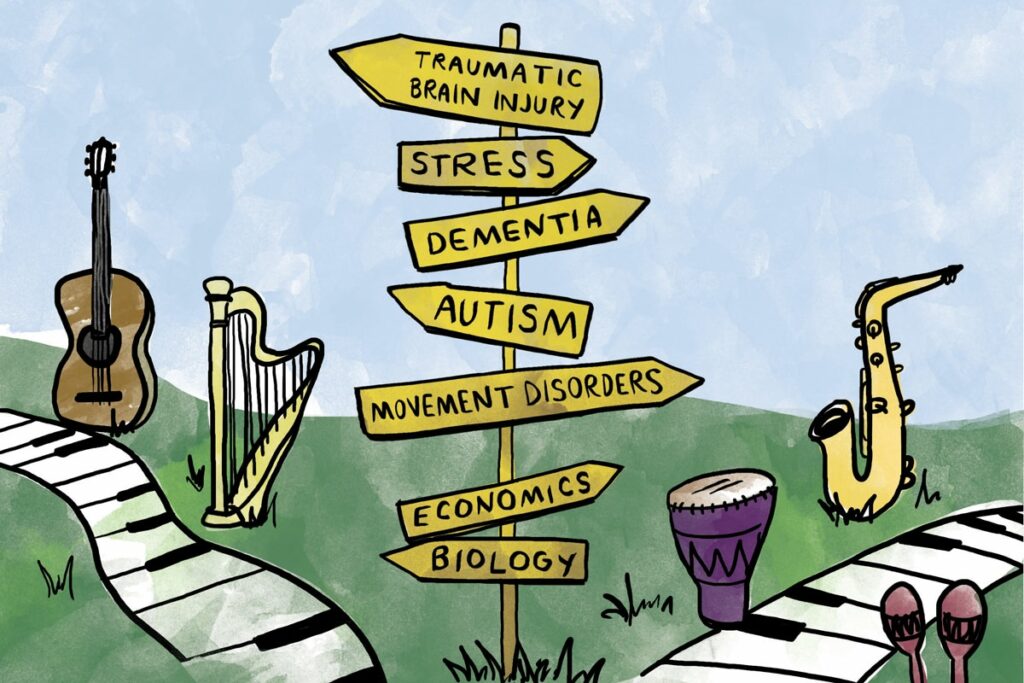Music is a universal language as it influences all levels of human existence. It is a medium of communication. Music has pleasant and healing properties. Various researches are going on to know about the healing powers of music.
Music is an age-old part of Ayurveda. From times immemorial, music has been a part of Indian culture. Music has been described in Brihatrayee in Ayurveda. In Vedas too, music has an important place. Samveda is full of music. The Vedas dating back to 1500 to 1700 B.C., contain many verses related to musicology and health. Therefore, influence of sound on music on health and disease states of mind and body seems to have been known since ancient times.

The science of Ayurveda speaks about the importance of sound, vibrations and music in the healing process. The suitable music and mantra not only help to relieve stress, they can have a therapeutic effect on the nervous system as well. Music therapy is known as Raga Chikitsa in Ayurveda. Both Hindustani and Carnatic tradition are meant to purify our body and mind and bring increased awareness.
Listening to music has been shown to produce multiple effects on the physiology of brain, which involves different areas of the brain and neural networks. The doshas like Vata, Pitta and Kapha can be effectively balanced by music therapy. It is necessary to vibrate the cells of the body and it is through the vibrations of music, the diseased person’s consciousness can be changed effectively to promote health. Listening to music helps in controlling negative aspects such as stress, anger, pain and tension.
What are the effects of Music on the human body?

- Pituitary Gland: It is believed that music stimulates the pituitary gland, whose secretions affect the nervous system and the flow of blood.
- Mental Health: Music is capable of improving happiness, peace, mental health, concentration etc. As we develop the habit of listening to music and mantras, we often become aware of the recurring thoughts of anger, stress, hatred, criticizing ourselves or others etc. Listening music can help to deeply reach our subconscious mind and purify these thoughts.
- Removes toxins: It is said that playing a particular type of music early morning can help neutralize toxins in the body when played with complete devotion.
- Hypertension: It has been found that physiological parameters such as heart rate, respiration and blood pressure may be lowered by listening calm and soothing music.
- The calm brain will lead to the stimulation of the body to release Nitric oxide (NO), which in turn acts on the blood vessels and lowers the blood vessel tone and dilates the blood vessels and hence reduces the blood pressure.
- Even devotional or religious music has been found to lower the systolic and diastolic blood pressure in hypertensive patients.
- The pulse rate also gets lower by listening soothing music.
- Low breathing rate is also achieved. Positive changes in the respiratory system may influence the prime brain centres concerned with emotions and thoughts.
- In Pregnancy: Garbhasanskara is an Indian traditional practice described in Ayurveda where low frequency chants are used as auditory stimulation to pregnant women from second trimester onwards.
- This process aims to provide health benefits to both the woman and the developing foetus.
- Effects of sounds on foetus are associated with favourable neuro-behavioural outcomes.
- It helps in the fine tuning of hair cells in the ear and their neuron connection to spiral ganglion and cochlear nuclei.
Thus, it can be said that music may have a positive impact on the neuroendocrine system especially on the autonomic nervous system.
In music therapy, selection of music should be according to the patient’s taste of music and patient preference is one of the most important factors affecting the choice of therapeutic music.
Music therapy is in infancy in India and it is a huge challenge to integrate musicological healing traditions into clinical practice. Many of the contemporary researchers have validated and supported ancient Indian cultures, hence, it is highly reasonable to explore, evaluate, understand and apply the integrate concepts of Indian music healing traditions into music therapy practice.
Disclaimer:-
This article is not a substitute to the standard Medical Diagnosis or personalized Ayurvedic Treatment! It is intended only for Information!
For experts consultation, please write us at care@blessayurveda.com.
2,459 total views, 1 views today